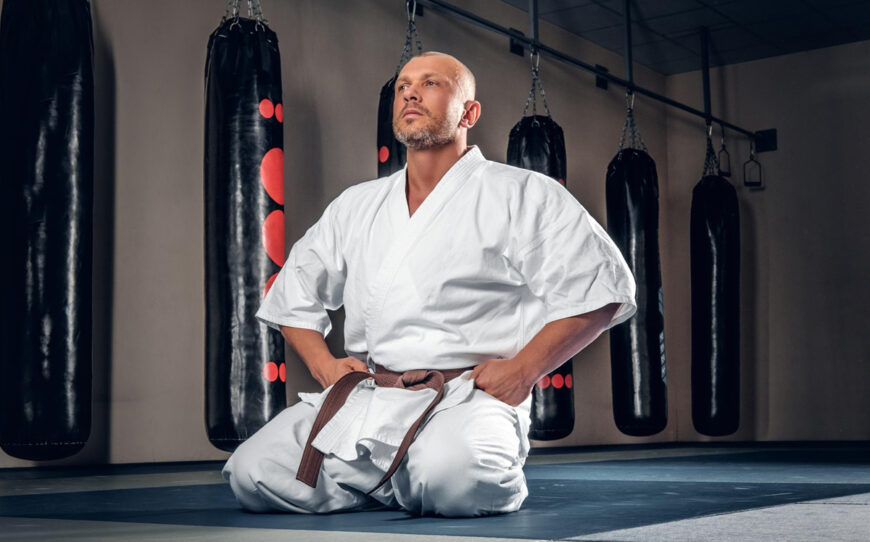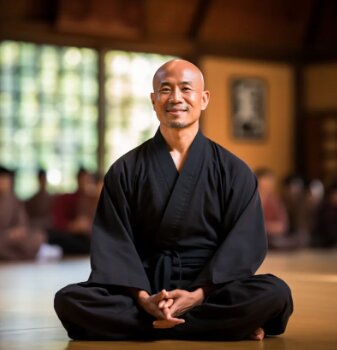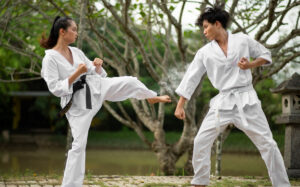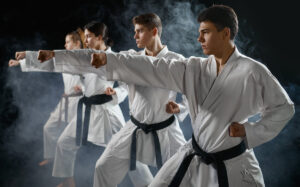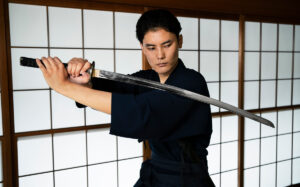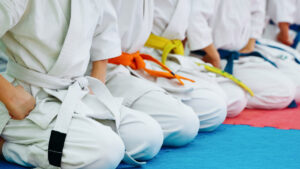Martial arts have a long and fascinating history, spanning across various cultures and styles. A knowledgeable and skilled instructor is at the heart of each style, responsible for shaping students’ abilities and character.
If you’ve ever wondered what these respected individuals are called in the world of karate, then look no further. In this blog post, we will explore the most common title given to a karate teacher and some alternative titles used.
Key Takeaways
- A karate teacher is commonly referred to as “sensei” in Japanese martial arts, and other titles such as grandmaster, master, Shihan, or renshi may also be used.
- The responsibilities of a karate teacher include developing students’ skills and character while fostering discipline, respect, and focus. They provide guidance and mentorship while creating a safe environment for learning traditional martial arts techniques.
- Karate teachers’ qualifications typically involve certification, ongoing skill development, and wider martial arts community involvement.
- Karate teachers play an essential role in guiding their students towards mastering the art form.
What Is A Karate Teacher Called?
In most forms of karate, people commonly refer to a karate teacher as “sensei,” which is a Japanese term translating to “teacher.”
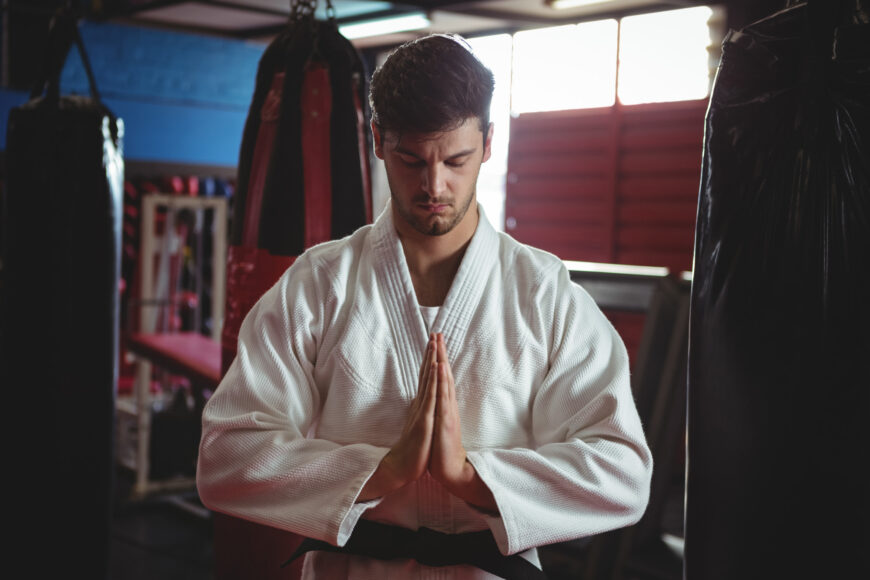
Sensei (Japanese)
In the martial arts world, people commonly refer to a karate teacher as “Sensei.” It is a Japanese term that translates to “the one who has gone before” or “teacher.” The title reflect the teacher’s accumulated experience and wisdom.
This title, “Sensei,” is also applicable to various disciplines like TaeKwonDo (called Sabom in Korean) and Kung Fu (known as Sifu in Chinese).
In any martial arts dojo or school, the role of the sensei goes beyond teaching practical skills and includes fostering discipline, and overall character development.
Sifu (Chinese)
In the realm of Chinese martial arts, the term “sifu” is used to address a karate teacher or instructor. Similar to the Japanese term “sensei,” sifu represents not only a teacher but also acts as an honorific title for someone who has attained considerable knowledge and skill in their discipline.
The role of a sifu extends beyond mere technical instruction; they guide students in character development, instilling traditional values such as respect, humility, and perseverance.
Sabom (Korean)
In Korean martial arts like Taekwondo, a teacher or instructor is commonly known as “sabom.” Sabom is a prestigious title held by highly trained practitioners with a profound understanding of their art.
While teaching technical skills and sports knowledge is crucial, saboms also focus on instilling values like discipline, respect, and humility among their students, values universally appreciated beyond the dojo.
Other Titles For A Karate Teacher
In addition to “sensei,” other common titles for karate teachers include “grandmaster,” “master,” and “shihan.”
Grandmaster
In Japanese martial arts, “grandmaster” is a title that refers to a highly respected and skilled practitioner who has reached the pinnacle of mastery. The term is often used in karate to describe an instructor who has dedicated their life to studying and teaching the art form.
A grandmaster is typically recognized for their extensive knowledge, experience, and contributions to the karate community. They are revered for their ability to pass on centuries-old traditions while also innovating and adapting new techniques.
Some examples of notable grandmasters in karate include Gichin Funakoshi, founder of Shotokan Karate; Chojun Miyagi, creator of Goju-ryu Karate; and Mas Oyama, founder of Kyokushin Karate.
These individuals not only mastered their craft but also shaped the trajectory of karate as we know it today.
Master
“Master” is a title that represents a high level of experience and skill in martial arts. In karate, it typically refers to instructors who have achieved the rank of 5th Dan or higher.
Masters are recognized for their knowledge and expertise, often serving as mentors to other instructors and students alike. As respected leaders in the dojo, they play a crucial role in developing students’ skills and ensuring that everyone is practicing karate safely.
Many masters in martial arts disciplines like karate spend years diligently practicing their craft before achieving this prestigious status. They may have trained with multiple senseis, learning from different styles and perspectives to become well-rounded practitioners.
Shihan
Another title that karate teachers may use is “shihan.” In Japanese martial arts, “shihan” translates to “master instructor.” This title is typically applicable to individuals who have achieved a high level of expertise in their art and demonstrated exceptional teaching abilities.
A Shihan is often responsible for training other instructors and ensuring the quality of instruction throughout their organization.
In addition to their technical skills, shihans embody the principles of respect, discipline, and humility central to martial arts practice. They serve as role models for their students and deeply respected within the martial arts community.
Renshi
Another title that you may come across when learning karate or other martial arts is “renshi.” This term is also of Japanese origin and translates to “polished expert” or “master practitioner,” indicating a high level of skill and experience.
Renshi is a title for achieving the rank of 6th dan black belt, demonstrating both technical proficiency as well as teaching ability. A renshi is someone who has honed their craft over years of dedicated practice and training, often serving as an assistant instructor to higher-ranked teachers in the dojo.
Responsibilities Of A Karate Teacher
A karate teacher is responsible for developing their students’ skills and techniques. He also helps in fostering discipline, respect, and focus. Providing guidance and mentorship, and creating a safe and inclusive environment is also their top priority.
Developing Students’ Skills And Techniques
Part of a karate teacher’s responsibility is developing their students’ skills and techniques. From beginner to advanced levels, instructors guide their students through various katas, forms, and drills to improve their strength, agility, flexibility, and accuracy.
Instructors also emphasize the importance of repetition and practice when learning new techniques. They use demonstrations and hands-on guidance to help students refine their movements until they become second nature.
Fostering Discipline, Respect, And Focus
One of the key responsibilities of a karate teacher is to cultivate discipline, respect, and focus among their students. Through consistent training and guidance, instructors instill these values in their students both on and off the mat.
Karate classes typically require strict adherence to rules such as bowing upon entering or leaving the dojo and showing respect to classmates.
By fostering discipline, karate teachers help their students develop self-control and restraint while also building physical strength and endurance. Respect for oneself, others, and the art form itself is emphasized through martial arts teachings.
Additionally, instructors encourage focus by teaching techniques that require intense concentration and perfect execution.
Providing Guidance And Mentorship
In addition to developing students’ technical skills, one of the key responsibilities of a karate teacher is providing guidance.
A good karate teacher serves as a role model for their students, demonstrating proper technique and leadership qualities.
Beyond technical instruction, this mentorship can extend to karate’s broader life lessons. Such as self-control, perseverance, and resilience. As a guide on the path toward mastery, the karate teacher helps instill these values in their students. They do it through their teachings in class and by setting an example outside of class time.
Creating A Safe And Inclusive Environment
One of the key responsibilities of a karate teacher is to create a safe and inclusive environment for their students. This means ensuring that the dojo or training space is free from any hazards or potential dangers, such as sharp objects or broken equipment.
Creating an inclusive environment also involves being sensitive to students’ different cultural backgrounds and learning styles. A good karate teacher will not marginalize certain groups based on race, religion, gender identity, age, or ability level.
Qualifications And Training For A Karate Teacher
To become a karate teacher, one must complete certification and education requirements. He must also engage in ongoing practice and skill development. Establishing a strong reputation and involvement in the martial arts community is also important.
Certification And Education Requirements
To become a certified karate teacher, one must undergo extensive training and education. Certification requirements vary depending on the martial arts school or organization.
For example, to earn the title of “sensei,” a practitioner must have years of experience and demonstrate proficiency in kata (forms), kumite (sparring), and weapons use.
Apart from technical skills, students expect karate teachers to have excellent teaching and communication skills to guide them effectively.
Becoming a certified karate teacher takes time and commitment but is ultimately rewarding for those who want to share their passion for martial arts with others.
Ongoing Practice And Skill Development
To be a successful karate teacher, ongoing practice and skill development are crucial. Karate is an ever-evolving art form that requires constant study and refinement.
This means participating in regular training sessions with other practitioners and attending seminars and workshops. Reading books on martial arts theory and history and watching instructional videos online are also important.
Additionally, staying up-to-date with technological advancements is important for any instructor today. With online learning becoming more popular due to current events around the world, instructors must stay informed of new resources available for teaching karate online safely and effectively.
Strong Reputation And Involvement In The Martial Arts Community
Having a strong reputation and active involvement in the martial arts community is vital for karate teachers.
This includes actively participating in competitions, attending workshops and seminars, collaborating with other instructors, and gaining recognition from reputable organizations.
Grandmasters like Mas Oyama, Gichin Funakoshi, and Bruce Lee have earned their legendary status through years of dedication to their craft.
Aspiring karate teachers can learn from these examples to build their reputations as respected practitioners within their communities.
Additional Teaching And Leadership Training
Karate teachers undergo rigorous training and certification processes to develop the skills necessary to teach their students effectively.
However, additional teaching and leadership training are also crucial for karate teachers to enhance their abilities further. These programs focus on developing instructional techniques, managing student behavior, providing effective feedback, and fostering an inclusive environment that encourages growth.
Many experienced karate teachers pursue advanced certifications such as Renshi or Shihan titles, which require extensive martial arts theory and application practice while focusing on leading and mentoring other instructors within a dojo.
Strong communication skills are essential for any teacher or leader; therefore, workshops addressing presentation skills can benefit educators looking to improve their ability to engage with students during class time more effectively.
FAQs
1. What is the term for a karate teacher?
People commonly refer to a karate teacher as a sensei.
2. Does every karate school use the term “sensei” for their instructors?
While “sensei” is widely applicable, some schools may have different titles such as “Shihan,” “Renshi,” or “Kyoshi.” It ultimately depends on the specific school and lineage.
3. Is there a specific level or rank that qualifies someone as a sensei?
Generally, one must obtain at least a black belt (or equivalent) to qualify enough to teach, which is called a sensei.
4. Can non-Japanese instructors also be called sensei in teaching Karate?
Yes, the term “sensei” can apply to anyone who teaches martial arts, regardless of nationality or ethnicity.
Conclusion
In Japanese martial arts, people refer to a karate teacher as “sensei,” although other titles like grandmaster and master may also be applicable.
The responsibilities of a karate teacher involve developing students’ skills and character while fostering discipline, respect and focus. Qualifications for becoming a karate teacher include certification and ongoing skill development.
Learn More About Karate:
- Taekwondo Vs Karate: The Ultimate Showdown
- Karate Uniform: Everything You Need To Know
- Best Martial Arts for Streetfight: Unleash Your Inner Warrior
- Martial Arts Belts, Their Colors, and How They Rank
- Kenpo Karate: A Concise Guide
- Top 21 Deadliest Martial Arts in the World According to Experts
- Guide to Karate Weapons
- The Karate Belt Order, Colors, and Ranking System

